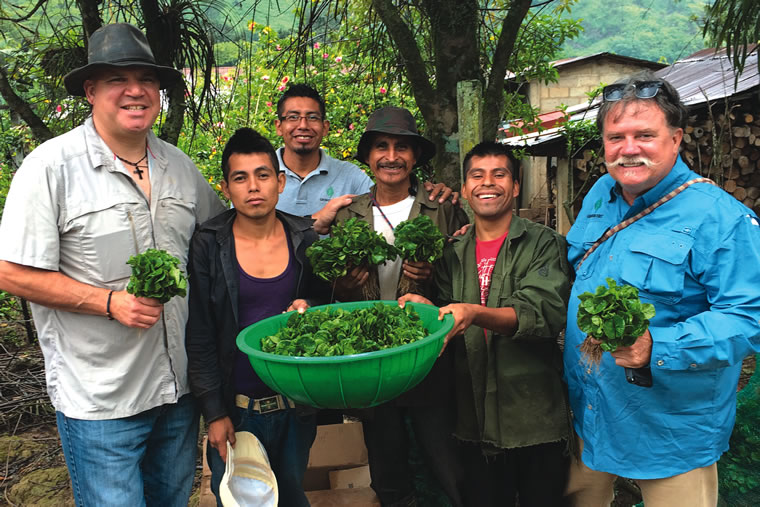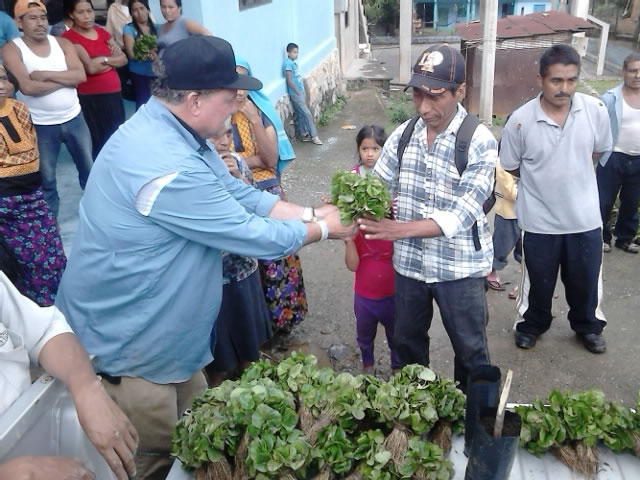
Outside a bright blue building in a remote mountain region of Oaxaca, Mexico, a crowd gathers as volunteers from nonprofit Growers First lift coffee tree seedlings from the back of a white truck. Approximately 6 to 8 inches in diameter, the plants resemble romaine lettuce; men in plaid shirts and baseball caps look on as an elderly woman extends her frail arms to receive a small, green bundle. She clutches it against her hand-sewn patterned blouse as if it were a wedding bouquet, acutely aware of its value though she may not live to see the fruit of her labor required to plant it. While its cherries won’t blossom for another three years, the small shrub is the key to providing hope for the next generation of her community.
Part of a project launched by Growers First, the seedlings are a gift in the wake of extreme devastation. A fungus called “la roya,” (the rust) began sweeping through coffee plantations in Central America about five years ago before making its way north; in Mexico alone, coffee production is down from 6 million bags in 2000 to 3.6 million bags in 2014, as reported by newspaper El Economista. Due to higher temperatures in recent years, the disease’s calamitous course has ascended to higher elevations, attacking the microlots hidden in the mountains where Growers First has been assisting subsistence farmers of the indigenous Mixe and Zapotec groups for nearly two decades.
As these communities—sheltered in adobe homes with no plumbing or electricity—face thousands of damaged acres across the state, the seedlings are a small piece of salvation. Now, with help from the Laguna Beach-based organization, all that’s left to do is plant and wait.
Decades of Service

Growers First was established in 2000 after founder Dave Day traveled to Oaxaca to buy coffee for his Irvine-based wholesale roaster and retail company, Specialty Coffee Services. His eyes were opened to the plight of local farmers, forced to sell their coffee cherries at low prices to local “coyotes,” or middlemen, who took advantage of their lack of resources; a year later the Laguna local sold his business to invest in the nonprofit full time.
Now ingrained in both Oaxaca and Honduras, the organization creates long-term sustainability by strengthening and diversifying crops—farmers are currently working on a “honey process,” for example, in which bits of the fruit are left on the coffee bean to make it sweeter—and also offers educational and financial support to obtain organic certification, which results in up to a 25 percent profit increase. Additionally, Dave procures buyers who are willing to pay premiums for the farmers’ arabica coffee and helps find a lender after purchase orders are established so farmers can receive a microloan at a reduced interest rate before batch processing at local dry mills.
“We’re not a big American company coming in to do it the American way,” says Dave, who works within the structure of local cooperatives. “All we do is add a lot of sunlight and water to the local talent and help them truly succeed.”
But the arabica coffee grown by the farmers in Oaxaca is also “more delicate and apt to get diseases,” Dave says, making the region—which was also densely populated with older trees—all the more susceptible to la roya. Growers First agronomist Jason Baca estimates that many of the local families are now living on less than $100 per year, as numerous male members have left the land they’ve been farming for generations to find work in neighboring villages and countries. “Our vision is to hopefully help farmers help themselves, so they may be able to stay on their ancestral lands and not be forced to migrate north,” Jason says. “Doing what we can to keep families together is essential.”
Sowing Seeds

Growers First increased relief efforts this past summer by distributing 10 chainsaws among the communities, expediting the process of cutting down the thousands of dead trees dotting the highland landscape. Nearly a half million were removed in July and August, as land inspections were also completed to ensure proper preparation for new seedlings—requirements include organic soil, shade trees and contour line terraces to eliminate erosion, among others. Since the first crop was distributed in December 2014, the project has nearly tripled the organization’s operation in the state—approximately 350 families from 20 villages are currently receiving assistance.
Seedlings are grown in a nursery next to a river for year-round irrigation, and planted in groups of more than 10,000 just a half-inch apart. Though coffee is traditionally grown in pots for four to six months, preliminary iterations of the project forced the farmers to carry half-gallon bags on foot back up the mountain. Last year, Growers First changed its approach: At 60 days old, the seedlings are removed, dipped in water and bundled in groups of 100 to be easily transported up the dirt roads by truck or backpack.
“Nobody else, that I see, is doing what [Growers First is] doing,” says Andrew Vournas, founder of importing company Vournas Coffee Trading and a buyer of the farmers’ coffee. “If Growers First wasn’t down there to give them trees, there’s nothing. They don’t have the money … Growers First has given them a lifeline.”
Even more unique to the project are the seeds themselves: Several years ago the organization began collecting seeds from trees that weren’t dying out in Oaxaca and continues to search for rust-resistant, heirloom varieties all over the world. Last year, 200,000 seeds of a Costa Rican variety were planted in the nursery, while those from Honduras are also exchanged. “We’re collecting the best of the best seeds,” Dave says. “We’re collecting ones not only resistant to [la roya, but] are going to get the farmers a premium price for their coffee and desired by roasters.”
Jason, who has spearheaded much of the agricultural experimentation, says he will continue to return to Oaxaca in search of rust-resistant hybrids, changing varieties annually over the next three years “until the diversity is established to prevent another farm tragedy of rust.” In an attempt at further protection, each farmer will be given a minimum of four different strains throughout their allotments of 300 to 500 seedlings each year.
“This is not really a scientific process, but an ancient one developed for survival; not one for the highest production, but one with the most resistance to the incessant plagues of the jungle in a closed loop system where no outside inputs are brought onto the farm,” Jason says. “There [are] very few, if any, American farms that would farm this way.”
Global Impact

Once the seedlings are distributed, farmers pot the bundles and wait about four months before planting the 1- to 2-foot-tall shrubs in the ground. This past fall in Oaxaca, Dave watched as a 3-year-old boy potted new seedlings alongside his father, the older man teaching his young son how to care for the plants that—in three years—could provide the security their community has lost in the wake of la roya. For Dave, the moment meant more than the potential for economic stability: It was not long ago that the Growers First founder remembers teaching the man’s father—the boy’s grandfather—to do the same. “Knowing that the land’s being preserved and new generations are working [it], that makes me feel good about the future,” Dave explains. This is the seed that Growers First is sowing: the possibility for history to repeat itself—for future generations of Oaxaca farmers to continue the coffee planting tradition that has become the fiber of their communities.
“There are people that don’t want to be farmers anymore,” Dave says. “You till the soil and you work the land so hard, and then all of a sudden a disease can wipe everything out. People say, ‘Why would I want this for my kids or my grandkids?’ If they leave that behind, we lose environmentally. People will cut down the rainforest or the jungles. … They’ll sell the trees as timber and poach the land, … and plant corn or something quick that [produces] immediate [profit].”
While the economic devastation is staggering, the environmental impact could prove equally as portentous. And yet, because there are “no easy systematic solutions to helping the indigenous in inhospitable and remote locations,” Jason says, the problem is often left unsettled—the 4 million people in Central America and southern Mexico who rely on coffee for a living, according to the Inter-American Development Bank, are left to fend for themselves. Despite the challenges, however, Growers First continues to remain in the region. “This has been an extraordinarily difficult job, the hardest thing I have ever been a part of,” Jason continues. “… [I] feel grateful after seeing hundreds of volunteers and NGOs come and go; only Growers First and Dave continue to be there.”
Over the next year, the Laguna organization will continue to collect seeds, plant seedlings—offer a reforestation solution to hundreds of farmers clamoring for preservation in the midst of the desolation left behind by la roya. And while it may take several years for the fruit to blossom, Oaxaca’s highlands will begin to look less bare. Yes, there will be waiting; but in the waiting, there is hope.
By the Numbers
Growers First is having a positive impact on the environment across the globe.
250:
Number of farming families Growers First assists in Honduras
350:
Number of farming families Growers First assists in Oaxaca
270,000:
Number of seedlings Growers First planted in Oaxaca in 2015
500,000:
Number of dead trees Growers First cut down in Oaxaca in 2015
1,000,000:
Number of seeds Growers First aims to plant in Oaxaca in 2016
—Written by Kristin Lee Jensen | Photos by Andrew Vournas




